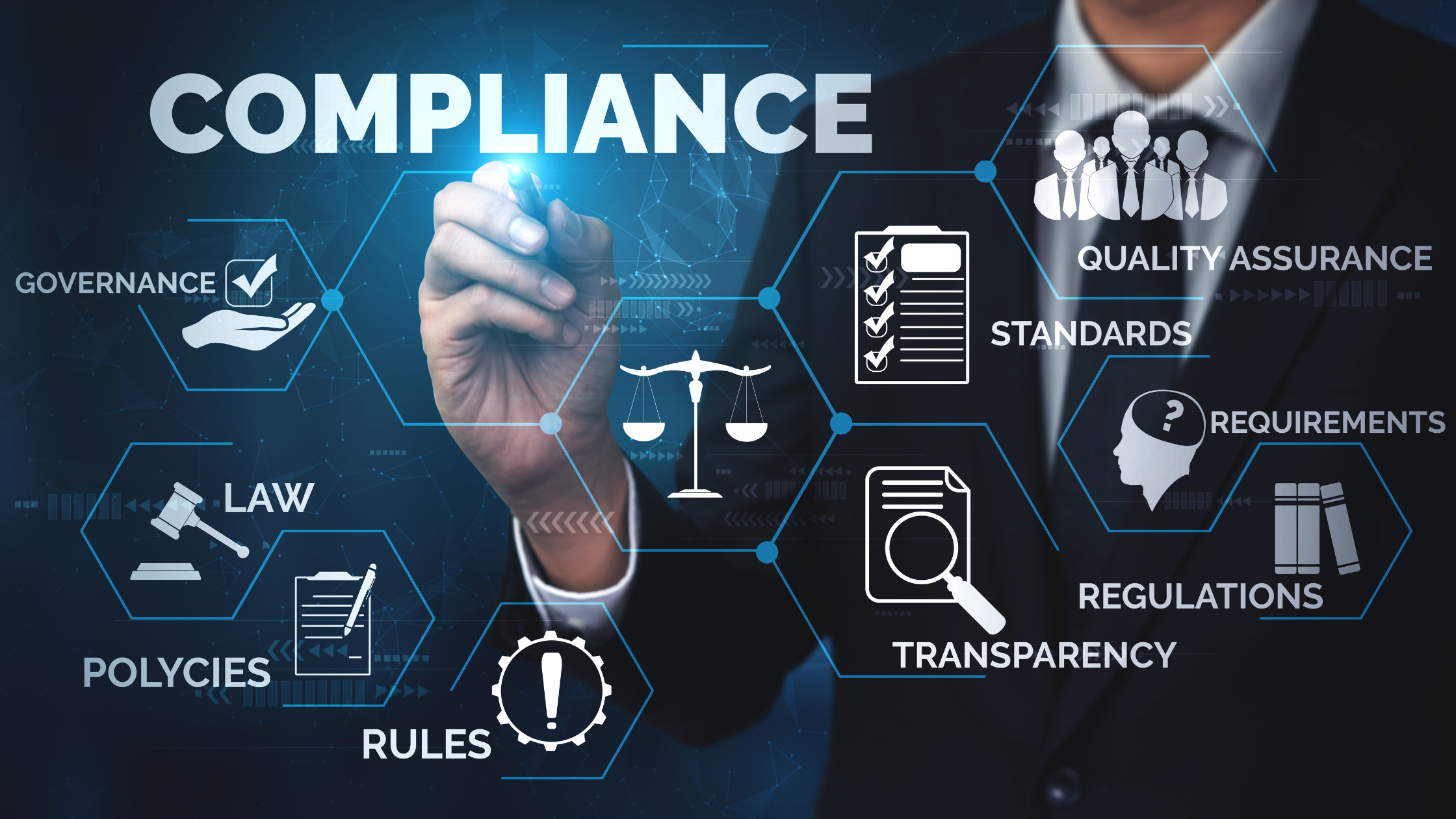The Security Business and State Regulation: What You Need to Know
State security regulations can be complex. But for security service providers, understanding them is key. These rules aren't just about legal issues. They protect the public. Plus, they can make your business look good. It shields you legally. And it makes you look like a top-notch player in the business.
By David Kerolles
June 28, 2023

Understanding the Landscape of Security Business Regulations
Businesses that provide security have become even more significant in today’s world. Their role in guarding property, inventory, data, and people is ever-evolving. The rules for a security business keep revising, based on new dangers, tech updates, and changes in society. It doesn’t matter if you provide security services, create security tech, or are a business owner boosting your own security. It is key for you to know, understand and implement the correct rules.
What are the objectives of security regulations? Security regulations exist to provide:
- Public Safety: the primary goal of security regulations is to ensure the safety and well-being of the public. Regulations establish minimum standards that security businesses must meet to provide effective protection without compromising safety.
- Standardization: regulations help standardize practices within the industry. This ensures that security businesses adhere to common principles, making it easier for clients and consumers to assess the quality and reliability of security services.
- Accountability: regulations hold security businesses accountable for their actions. In cases of misconduct or negligence, regulatory bodies can take legal action to protect consumers and maintain the integrity of the industry.
- Adaptation to New Threats: as security threats evolve, regulations must adapt to address these changes. This includes new technologies, cyber threats, terrorism, and other emerging challenges that security businesses need to confront.
Key Areas of Security Business Regulations
Security business regulations cover a wide range of areas, which include:
- Licensing and Certification: many countries and regions require security businesses and their personnel to obtain specific licenses and certifications. This ensures that individuals working in the security sector have the necessary skills and training.
- Data Privacy and Cybersecurity: with the increasing importance of data protection, regulations related to data privacy and cybersecurity are on the rise. Security businesses often handle sensitive information, and they must comply with data protection laws to prevent breaches and data theft.
- Physical Security Standards: regulations may dictate the standards for physical security measures, such as alarm systems, access control, surveillance, and perimeter security.
- Use of Force and Legal Authority: security personnel often have to make judgment calls regarding the use of force. Regulations provide guidelines on the appropriate use of force and the legal authority granted to security personnel.
- Employee Background Checks: regulations may require thorough background checks for individuals working in the security industry to ensure that they have a clean criminal record and are fit for the role.
- Training and Continuing Education: security professionals may be required to undergo regular training and continuing education to stay updated on industry best practices and regulatory changes.
11 Key Compliance Strategies: The Impact of State Laws on Security Business Operations
Running a security service firm involves more than alertness and expertise- you need a deep grasp of the laws and rules in which your company must operate. National laws create a general structure for operations, but you must also incorporate your state’s laws. Unlike federal laws, which apply uniformly across the country, state laws can differ significantly from one state to another. These variations can pertain to licensing requirements, training standards, use of force regulations, and more. Here are some strategies for compliance in all areas, so you can thrive as a security service provider and avoid legal pitfalls:
- Know Your State Laws: start by thoroughly researching and understanding the security-related laws and regulations specific to your state- including licensing requirements, training mandates, or other unique regulations. State government websites are your initial valuable references (e.g. for CA, for TX, for NY, for FL, etc.)
- Stay Updated: laws can change, and new regulations may be enacted. Regularly monitor legislative updates and changes to state laws that could impact your business. Joining industry associations or networks can also help you stay informed about legal developments. For example, NASCO (National Association of Security Companies) represents private security companies nationally and offers broad business insights. PSPA (Private Security Professionals of America) is another. CALSAGA (California Association of Licensed Security Agencies, Guards, and Associates) is specific to CA. ASSIST(Associated Security Services/Investigators of the State of TX) focus on TX, and so forth. Every state has their own useful security industry organizations.
- Tailor Your Operations: recognize that what may be acceptable in one state might not be in another. Customize your security protocols and procedures to align with the specific requirements and expectations of the state in which you operate. This may include adjusting training programs and use-of-force policies.
- Consult Legal Experts: when in doubt, seek legal counsel. Consulting with attorneys experienced in security business regulations can ensure your operations are compliant, plus represent your interests if legal issues arise. You may need legal counsel in different areas- startup, LLC formation, contract or more.
- Maintain Meticulous Records: compliance often hinges on documentation. Keep detailed records of employee certifications, training, incident reports, and any other relevant information. Regularly verify that certifications are current and that employees are meeting state-mandated training requirements. This not only helps with compliance but also serves as a safeguard in case of legal disputes.
- Collaborate with State Authorities: building a positive relationship with state regulatory authorities can be beneficial. Reach out to relevant agencies or boards and establish open lines of communication. This proactive approach can help you address compliance concerns and navigate regulatory challenges more effectively.
- Educate Your Team: ensure that your security personnel are well-informed about state laws and regulations. Regular training and education should include your state’s updates on legal requirements and expectations for compliance.
- Select Accredited Training Programs: make sure to choose training programs that are accredited or recognized by your state’s regulatory authority. Accredited programs are more likely to align with state standards and provide comprehensive training.
- Implement Ongoing Training: training doesn’t stop once guard certification is achieved. Continuous learning/skill development are essential and often regulated by state laws. For instance in California, security guards must take an 8-hour refresher course every year. Other states have similar laws. In NY, since security guard registration is issued for 2 years, you must complete two 8-hour annual in-service training courses during that time period to remain current. Armed security guards have additional annual firearms training requirements in many states as well.
- Engage in Practical Training: practical, hands-on training is essential. Simulations and real-world scenarios can help security personnel apply their knowledge effectively in various situations.
- Invest in Technology: stay at the forefront of security technology to ensure compliance with evolving regulations. Investing in advanced security solutions and equipment can keep your operations competitive and compliant.
The Benefits of Compliance
Adhering to state training and certification standards offers several advantages:
- Legal Protection: compliance with state laws protects your business from potential legal issues, including fines, penalties, and license revocation.
- Enhanced Reputation: demonstrating a commitment to high training standards enhances your reputation as a security service provider. Clients are more likely to trust and hire well-trained professionals.
- Improved Security: well-trained and certified personnel are better equipped to handle security threats, ensuring a safer environment for clients and the public.
- Competitive Advantage: compliance with state standards can set you apart from competitors who may not meet the same rigorous training requirements.
Training and certification are not only vital for the effectiveness and safety of security personnel but also for ensuring compliance with state standards. By staying informed about state requirements, providing comprehensive training, and maintaining accurate records, security service providers can navigate the regulatory landscape successfully while delivering top-notch security services.
Future Trends: Anticipating Changes in State Security Regulations
Anticipating change is crucial for security service providers to stay compliant and adapt to the evolving regulatory landscape. Here are some future trends that will likely impact state security regulations.
1. Emphasis on Cybersecurity
In an increasingly digital world, cybersecurity has become a paramount concern. State governments are likely to strengthen regulations around data protection and cybersecurity practices for security service providers. This may include requirements for the secure handling of sensitive information, regular cybersecurity audits, and mandatory breach reporting.
2. Privacy Laws and Surveillance Restrictions
Privacy concerns are on the rise, and states may introduce stricter regulations on surveillance practices and the collection of personal data. Security businesses that use surveillance technologies may need to navigate more stringent rules to protect individuals’ privacy rights while still providing effective security.
3. Use of Artificial Intelligence (AI) and Automation
The adoption of AI into security operations is expected to grow. States may introduce regulations to govern the use of AI-powered surveillance systems, drones, and other automated security technologies. These AI/ML regulations may address issues related to data retention, accuracy, and ethical considerations.
4. Training and Education Standards
As the security industry becomes more specialized and diverse, states may update training and education standards for security professionals. This could involve requiring additional training in specific areas, such as cybersecurity or de-escalation techniques for personnel dealing with public interactions.
5. Licensing and Certification Updates
State licensing and certification requirements for security professionals may become more comprehensive and specialized. Security service providers may need to ensure that their personnel hold the appropriate certifications for their roles and that they meet continuing education requirements.
6. Response to Emerging Threats
Security regulations may adapt to address emerging threats such as cyberattacks, domestic terrorism, and global pandemics. States may require security businesses to have contingency plans and response protocols in place to mitigate these risks effectively.
7. Environmental Sustainability
With an increasing focus on environmental sustainability, states may introduce regulations related to the environmental impact of security operations. This could include guidelines for eco-friendly security equipment and practices.
8. Transparency and Accountability
There may be a growing demand for transparency and accountability in security operations. States could require security service providers to document and report incidents and interactions, fostering accountability and transparency in the industry.
Frequently Asked Questions About Security Regulations:
What Is The Meaning Of Security Regulation?
Regulation gives security businesses legal protection, enhanced reputation, optimum security, and competitive advantages.
What Are The Objectives Of Security Regulations?
They help security businesses provide public safety, standardization, accountability and adaptability to new threats.
What Are The Laws For The Security Industry?
They are the complex framework of federal, state, and local security regulations with the core principle of professional security with integrity.
In conclusion, state security regulations can be complex. Yet for security service providers, mastering them is key.
These rules aren’t just about legal issues- they can protect the public, make your business professional and legitimate, shield you contractually, and make you a top-notch player in the security field.
By following the correct regulations and rules, your business will find a long-term winning secret recipe.
Related Posts
Regulations
Familiarize yourself with the legal requirements for offering security guard services. Ensure compliance and protect your business from legal complications.
By David Kerolles
August 21, 2023
Business Growth
Technological progress has profoundly transformed the realm of surveillance equipment, delivering unparalleled functionalities for safety and supervision in this digital era. Integrating artificial intelligence (AI) and improving image recognition has not only boosted surveillance efficiency but also sparked crucial debates concerning privacy and ethical implications.
By Richelle Mayor
November 29, 2023
Regulations
Security guards are an important part of any business, and it’s essential to ensure that your security guard force is up to date on the latest industry standards. In this article, we’ll explore the requirements, regulations, and best practices that govern the security guard industry. The Importance of Compliance Security guard companies are responsible for […]
By David Kerolles
August 23, 2023





